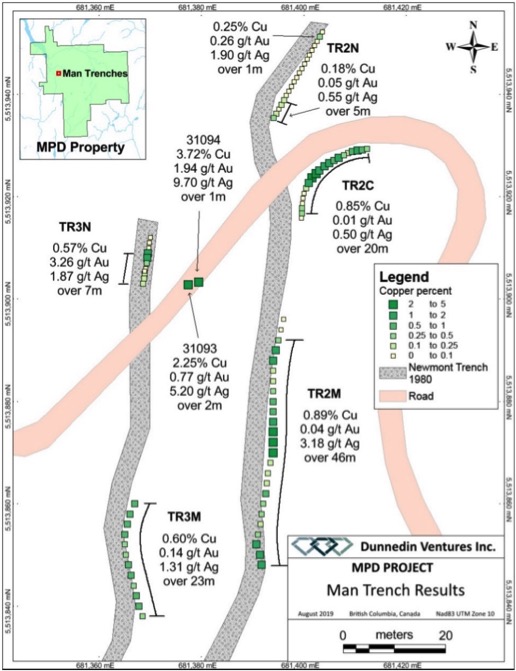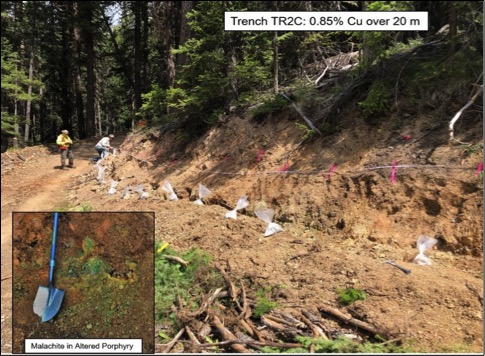Dunnedin Trenches 0.89% Copper Over 46.0 m and 3.26 g/t Gold Over 7.0 m at MPD Copper-Gold Porphyry Project, Southern British Columbia
August 22, 2019 – Vancouver, British Columbia – Dunnedin Ventures Inc. (the "Company" or “Dunnedin”) (TSX-V: DVI) today announced first results from the 2019 exploration program at its 100% owned MPD Copper-Gold Porphyry Project in Southern Central British Columbia.
The MPD project is accessible year-round via paved highway and situated approximately 40 kilometres from Merritt, British Columbia. In preparation for upcoming drilling, the Company initiated mapping, prospecting, soil sampling and resampling of historic trenches on the property. Initial work consisted of 93 rock chip samples covering 127 metres of aggregate strike length of reopened historical trenches in the “Man” area of the property. The Company will use these results to characterize the porphyry system at MPD to guide upcoming drilling.
New assay results from historical trenches are provided in Table 1. Highlights include:
- 0.89% copper and 0.04 g/t gold over 46.0 metres, including 1.83% copper and 0.08 g/t gold over 12.0 metres
- 0.60% copper and 0.14 g/t gold over 23.0 metres
- 0.57% copper and 3.26 g/t gold over 7.0 metres
- Mineralization is consistent with historical reports and confirm a significant copper-gold porphyry system is present on the property
- Mineralized porphyritic syenite-monzodiorite has a copper oxide overprint at surface, and contains copper sulfides (chalcopyrite, bornite) and pyrite confirmed by historic drilling
- Copper mineralization is associated with gold and silver mineralization
- Elevated gold values appear spatially associated with late cross-cutting high-angle structures
Claudia Tornquist, President and CEO of Dunnedin said, “Our first results from resampling historic trenches at MPD have confirmed strong mineralization over significant widths at surface, occurring within the preferred porphyritic host rocks. Results from this field work is extremely encouraging and correlate well with historic results that suggest potential for a large, under-explored mineralized system at MPD. We are excited to expand our efforts to make meaningful discoveries on this project as the year progresses.”
Chris Taylor, Chairman of the Board of Directors of Dunnedin said, “We selected the MPD project because it has key characteristics that could lead to a low-cost new discovery. Mainly, excellent infrastructure access which helps cut costs, over 100 historical drill holes and trenches that define a 10 square kilometre, multi-zoned mineralized system and consolidation of the previously separate Man, Prime and Dillard properties under one umbrella. As a Dunnedin shareholder, I very much look forward to what our upcoming drill program could bring.”
Upcoming exploration results from the MPD Project include:
- Results from a 200-sample soil survey covering approximately 800 by 1000 metres designed to augment existing geochemical data in the Man target area
- Results from 48 rock samples collected during prospecting-geological traverses and from additional trenches in the Man, Prime and Dillard target areas
MPD Trench Sampling – Man Prospect
In preparation for drilling at MPD, field crews began evaluating historic drill and trench sites on the property in July. As part of this work, surface trenches originally excavated by Newmont Exploration Canada Inc. at the Man prospect in 1980 were resampled by hand trenching (see Figure 1 and 2). The Company collected 93 rock chip samples, 1 to 2 metres in length, from five segments within two historic trenches. Trench resampling totaled 127 metres in the Man prospect area (see Table 1).
Table 1 – 2019 MPD Trench Sampling Results – Man Prospect
| Trench ID | From (m) | To (m) | Interval (m) | Cu% | Au g/t | Ag g/t | |
| TR2M (0-50m) | 4 | 50 | 46 | 0.89 | 0.04 | 3.18 | |
| Includes | 16 | 28 | 12 | 1.83 | 0.08 | 7.67 | |
| TR2N (0-20m) | 0 | 5 | 5 | 0.18 | 0.05 | 0.55 | |
| 18 | 19 | 1 | 0.25 | 0.26 | 1.90 | ||
| TR2C (0-21m) | 1 | 21 | 20 | 0.85 | 0.01 | 0.50 | |
| includes | 7 | 15 | 8 | 1.52 | 0.01 | 0.71 | |
| TR3M (0-23m) | 0 | 23 | 23 | 0.60 | 0.14 | 1.31 | |
| TR3N (0-10m) | 3 | 10 | 7 | 0.57 | 3.26 | 1.87 | |
| Includes | 3 | 6 | 3 | 1.19 | 4.95 | 3.70 | |
| TR3N (31093) | grab | 0 | 2 | 2 | 2.25 | 0.77 | 5.20 |
| TR3N (31094) | grab | 0 | 1 | 1 | 3.72 | 1.94 | 9.70 |
*Width represents trench sample length and is not intended to reflect true width.
Figure 1 - 2019 MPD Trench Sampling Map – Man Prospect

Figure 2 - 2019 MPD Trench Sampling TR2C – Man Prospect

Copper in the Man trenches consists primarily of malachite, azurite and neotocite oxides, usually on fracture/contact/jointing surfaces, or as disseminations and blebs in host rocks. Gold occurs over narrower widths near fault contacts. Mineralization is hosted by a complex assemblage of hydrothermally altered (argillic and sericitic) and unaltered porphyritic syenite-monzodiorite, intruding into lesser amounts of Nicola Group volcano-sedimentary rocks. Host rocks display fault displacement with sharp contacts and fault gouge, separating blocks of massive to altered variants. Porphyry emplacement within the trench area has been described as either a central stock, or irregular northwest trending dyke-like bodies. Most crosscutting structures similarly strike north to northwest and dip steeply to the east.
The MPD Project’s Nicola Belt geology has many similar characteristics to nearby alkalic porphyry systems at the Copper Mountain Mine to the south, and New Gold’s New Afton Mine to the north. Past exploration has identified numerous copper showings over a large, 10 square kilometre area. Copper and gold mineralization extends from surface, with earlier drilling on the property rarely testing below 200 metres vertical depth. Several historic holes that exceeded 200 metres indicate the potential for porphyry-type mineralization of significant depth and size.
MPD 2019 Permitting
Dunnedin has applied for a multi-year area-based Exploration Permit with the British Columbia Ministry of Energy, Mines and Petroleum Resources requesting authorizations allowing up to 18 drill pads and up to 10 mechanical trenching sites in 2019 and 2020. Dunnedin’s application is in the final stages of the review process by regulators. The Company expects to commence drilling immediately upon receipt of the permit.
QA/QC
All rock samples were sent to ALS Canada Ltd. (ALS) in North Vancouver, BC for preparation and final analysis. ALS meets all requirements of International Standards ISO/IEC 17025:2005 and ISO 9001:2015 for analytical procedures. Rock samples were analyzed using ALS’s Fire Assay Fusion method (Au-AA24) with an AA finish for gold; and by a 33-element four acid digest ICP-AES analysis (ME-ICP61) with additional analysis for Ore Grade Elements (ME-OG62) and Ore Grade Cu (Cu-OG62). Results were reported in parts per million (ppm) and converted to percent (%) and grams per tonne (g/t). QA/QC includes internal lab standards, duplicates, re-assays, and blanks inserted by ALS. All QA/QC results were within expectations.
Jeff Ward, P.Geo, Vice President Exploration and the Qualified Person as defined by National Instrument 43-101, has reviewed and approved the technical information contained in this release.
For further information please contact Mr. Knox Henderson, Investor Relations, at 604-551-2360 or khenderson@dunnedinventures.com.
On behalf of the Board of Directors
Dunnedin Ventures Inc.
Claudia Tornquist
President & CEO
About Dunnedin Ventures Inc.
Dunnedin Ventures is advancing copper porphyry projects in Canada and the USA; and the Kahuna diamond project in Nunavut, Canada. Dunnedin’s porphyry assets all present known mineral discoveries with the potential to hold large-scale deposits. They include the Trapper copper-gold porphyry project in the northern Golden Triangle region of British Columbia, the MPD copper-gold porphyry project in the prolific Quesnel Trough in south-central British Columbia and the Mohave copper-molybdenum-silver porphyry project near the world-class Bagdad mine in Arizona.
The advanced-stage Kahuna diamond project in Nunavut hosts a high-grade, near surface inferred diamond resource and numerous kimberlite pipe targets. Dunnedin has title to 809 km2 of mineral tenure, with diamond rights covering 1,664 km2 in Nunavut, 26 kilometres from Rankin Inlet and adjacent to Agnico Eagle’s Meliadine gold mine. Dunnedin’s exploration is aimed at the discovery of diamondiferous kimberlite pipes, working with its advisor and largest shareholder Dr. Chuck Fipke.
Based in Vancouver, Dunnedin is backed by a world-renowned team of exploration experts with decades of combined exploration experience and significant capital market strength. Dunnedin is part of the Discovery Group of companies led by John Robins, one of the most successful mining entrepreneurs in Canada.
Neither TSX Venture Exchange nor its Regulation Services Provider (as that term is defined in the policies of the TSX Venture Exchange) accepts responsibility for the adequacy or accuracy of this release.
Statements included in this announcement, including statements concerning our plans, intentions and expectations, which are not historical in nature are intended to be, and are hereby identified as, "forward- looking statements". Forward-looking statements may be identified by words including "anticipates", "believes", "intends", "estimates", "expects" and similar expressions. The Company cautions readers that forward-looking statements, including without limitation those relating to the Company's future operations and business prospects, are subject to certain risks and uncertainties that could cause actual results to differ materially from those indicated in the forward-looking statements. Accordingly, readers should not place undue reliance on forward-looking statements. Forward-looking statements contained herein are made as of the date of this news release and the Company disclaims any obligation to update any forward- looking statements, except as required by applicable securities laws.

